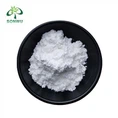What Is Larazotide Acetate
Larazotide acetate is a compound under clinical investigation for its potential to treat conditions involving abnormal intestinal permeability, such as celiac disease. This condition, which is an autoimmune disorder, causes the immune system to react negatively to the protein called gluten that is present in rye, barley, and wheat. By fortifying the intestinal barrier and preventing dangerous substances like Gluten from triggering immunological reactions and inflammation, It aims to reduce the symptoms of celiac disease. If you are interested in Larazotide acetate, please do not hesitate to contact Xi'an Sonwu.
It acts by modulating the tight junctions between epithelial cells in the gut lining. These tight junctions control the permeability of the intestinal barrier, ensuring that only nutrients and harmless substances are absorbed while harmful pathogens or particles are blocked. In conditions like celiac disease, these tight junctions can become loosened, allowing Gluten and other foreign materials to cross the gut lining and provoke an immune response.

It works by restoring the normal functioning of these tight junctions, reducing intestinal permeability (a process known as "leaky gut"). Doing so helps prevent the immune system from mistakenly attacking the intestines when Gluten is consumed, potentially alleviating symptoms of celiac disease.
In celiac disease, for example, Gluten triggers an immunological response that damages the small intestine.it is thought to reduce this immune reaction by preserving the intestinal barrier's integrity.
While it is still undergoing clinical trials, it has shown promise in helping to reduce signs of gluten exposure in individuals with celiac disease; It's not yet widely approved for clinical use.
What Is The Use Of Larazotide Acetate
It is primarily being investigated for its potential to treat celiac disease, a condition where GluteGluten,rotein included in wheat, barley, and rye, triggers an immune response that damages the tiny intestine's lining when consumed.In people with celiac disease, the immune system mistakenly attacks the intestines when gluteGlutenonsumed, leading to inflammation and intestinal damage.
It works by modulating intestinal permeability. It helps to regulate the gut lining's strong connections between cells, which are in charge of controlling what passes through the gut wall. In celiac disease, these tight junctions become "leaky," allowing gluteGlutenother harmful substances to pass into the bloodstream and trigger an immune response. it is thought to restore the integrity of these tight junctions, reducing intestinal permeability and preventing the harmful effects of gluten exposure.
The potential use of larazotide acetate includes:
1. Celiac Disease: The primary therapeutic potential of it is in the treatment of celiac disease. Celiac disease sufferers need to follow a rigorous gluten-free diet in order to avoid triggering symptoms, but even small amounts of gluten exposure can result in adverse effects.it, by reducing intestinal permeability, could provide a way to mitigate the effects of accidental gluten exposure, thus improving the quality of life for those with celiac disease.

2. Irritable Bowel Syndrome (IBS): Some research suggests that it may have applications beyond celiac disease. For example, it could be useful in treating like IBS, or irritable bowel syndrome, in which the intestines permeability plays a role in symptoms like bloating, gas, and discomfort. The drug's potential to regulate intestinal permeability may also make it useful for inflammatory bowel disease (IBD), although further research is required to confirm its effectiveness in these areas.
3.Other Intestinal Disorders: The modulation of intestinal permeability is a key focus in the study of various gastrointestinal disorders, and it may eventually find broader applications in treating other diseases related to leaky gut and immune system dysfunction.
What Are The Side Effects Of Larazotide Acetate
It is still undergoing clinical trials, so its long-term safety and full profile of side effects are not fully established. However, based on the available clinical data from these trials, some potential side effects of larazotide acetate have been observed. These include:
1. Gastrointestinal issues:
Bloating
Abdominal discomfort
Diarrhea
Constipation
Nausea
2. Headache: Some individuals may experience headaches while taking larazotide acetate.

3. Fatigue: Some participants in trials have reported feeling unusually tired.
4. Allergic reactions: While rare, any medication can cause allergic responses, including skin rashes. or itching.
5.Mild immune system reactions: Because it affects the immune system, there may be a possibility of mild immune-related side effects, though these have not been significant in trials so far.
It is an innovative therapeutic candidate with significant potential for treating celiac disease and potentially other conditions involving intestinal permeability. By repairing the intestinal lining's structural integrity and reducing inflammation, it could offer a promising addition to the current treatment options for individuals with celiac disease, particularly those who struggle with accidental gluten exposure. However, its approval and use will depend on the outcomes of ongoing medical research, which will provide more information on its safety, effectiveness, and potential side effects. Until then, patients interested in larazotide acetate should discuss it with their healthcare providers as part of a comprehensive treatment plan.
If you want to know the price of Larazotide acetate, are interested in Xi'an Sonwu, or have other questions about the product, do not hesitate to contact Xi'an Sonwu.





